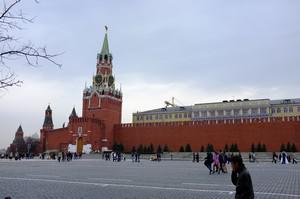The Russia connectionHow to respond to Russia's attacks on democracy
Much of the public discourse concerning Russian interference has highlighted Russia’s use of disinformation to meddle in the U.S. elections, but the Kremlin’s activities extend beyond just interfering in elections. These activities encompass a comprehensive, asymmetric toolkit that exacerbates existing social divisions in Western societies, aiming to undermine democratic governments and institutions. Moscow, as a declining power, has opted for low-cost methods such as information warfare, hacking, political support for extremist groups, economic coercion, and illicit finance in an effort to undermine its perceived enemies in the West and create the perception that democracy is an inherently corrupt system.

The Kremlin in Moscow // Source: commons.wikimedia.org
Last Wednesday, the Alliance for Securing Democracy hosted U.S. Senator Ben Cardin (D-MD), U.S. Congressman Will Hurd (R-Texas), and former U.S. Secretary of Homeland Security Michael Chertoff for a discussion of Russia’s continued assault on democracies and how the United States — along with its European partners and allies — can effectively respond to Russia’s actions. For his part, Senator Cardin presented findings from a new minority staff report by the Senate Foreign Relations Committee titled, Putin’s Asymmetric Assault on Democracy in Russia and Europe: Implications for U.S. National Security. As the report acknowledges, liberal democracies like the United States have challenged Vladimir Putin’s ability to use military might, propaganda, and the repression of dissent to consolidate power behind the façade of restoring Russia to greatness. Thus, the report focuses on the various tools President Putin has employed — including, but not limited to, military aggression, disinformation, malign finance, organized crime, and social and religious leverage — to undermine democracy in 19 countries over the course of the past two decades. Cardin’s report makes policy recommendations for the United States government, including calling on it to improve coordination of all elements of United States policy and programming to counter and deter Russian hybrid threats, to expose and freeze the Kremlin’s illicit finance operations in the United States and Europe, and to strengthen global cyber-security defenses and norms.
As former Secretary Chertoff acknowledged, much of the public discourse concerning Russian interference has highlighted Russia’s use of disinformation to meddle in our elections; however, the Kremlin’s activities extend beyond just interfering in elections and encompass a comprehensive, asymmetric toolkit that exacerbates existing social divisions in our societies and aims to undermine democratic governments and institutions. Moscow, as a declining power, has opted for low-cost methods such as information warfare, hacking, political support for extremist groups, economic coercion, and illicit finance in an effort to undermine its perceived enemies in the West and create the perception that democracy is an inherently corrupt system.
